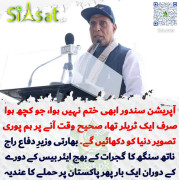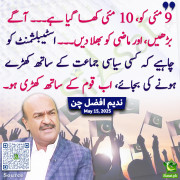RiazHaq
Senator (1k+ posts)
http://www.riazhaq.com/2014/10/india-pakistan-economic-comparison-2014.html
India and Pakistan are running neck and neck in per capita GDP in both nominal US dollar terms and purchasing power parity terms, according to data available from multiple sources.

Nominal and PPP GDP:
CIA World Factbook reports that the 2013 official exchange rate GDP of India is $1.67 trillion while that of Pakistan is $237 billion. It's a ratio of 7, about the same as the population ratio between the two countries.
World Bank's International Comparison Program (ICP) 2011 did a detailed cross-country purchasing power comparison and estimated $778 billion PPP GDP for 2011. It put India's GDP at $5,757 billion, about 7.4 times Pakistan's. It makes India's economy the third largest andPakistan's economy 23rd largest in the world in PPP terms. The ICP findings conclude that Pakistan's per capita income is US$4,450.00, just slightly below India's US$4,735.00.
Poverty Rates:
The number of Pakistanis living below the 2005 $1.25 poverty line (set at $1.44 for 2011) is 4.8 million, less than one-seventh of the 35.1 million reported earlier., according to Center for Global Development (CDG). It is a huge drop from about 20% of the population to 3% of the population living below the international poverty line.
Poverty rates for many other nations, including India and Bangladesh, have also seen dramatic downward revisions. As a result, India now has 102 million poor, just slightly above China's 99 million. In fact, the new report has cut the world poverty rate in half from 19.7% to 8.9%. Reduction from 21% to 3% for Pakistan poverty is much sharper than the rest of the world because ICP 2011 found it to be the second cheapest in the world.
The revision became necessary after the World Bank's International Comparison Program (ICP) completed a detailed study of a list of around 800 household and non-household products to compare real purchasing power for trans-national income comparison program (ICP). The CDG explained that the revision in poverty rate was necessitated by the results of latest ICP. It said: "Pakistan’s PPP conversion rate for GDP was 19.1 Rupees to the dollar in 2005 and 24.4 in 2011 — a gentle increase of 28 percent. The Consumer Price Index in Pakistan has gone up 102 percent over that same period. That might reflect changing or inadequate ICP commodity baskets or consumption data in one or both years, or mismeasurement of prices by Pakistan’s statistical agencies. But whatever the reason, it appears to apply to a lot of countries. Very few places saw PPP conversion rates climb close to or more than CPIs between 2005 and 2011, which is why poverty rates based on the 2011 PPP numbers tend to be lower."
Rural Poverty:
One of the key reasons for lower rural poverty in Pakistan is the relatively high per capita agriculture value added for its region.
Livestock revolution enabled Pakistan to significantly raise agriculture productivity and rural incomes in 1980s. Economic activity in dairy, meat and poultry sectors now accounts for just over 50% of the nation's total agricultural output. The result is that per capita value added to agriculture in Pakistan is almost twice as much as that in Bangladesh and India.
GDP Growth Rates:
While per capita GDPs of Pakistan and India are neck-and-neck at the moment, the fact is that economic growth rates in Pakistan are continuing lag India and other SAARC economies.
Meager 4.1% GDP growth reported by Pakistan for 2013-14 caps sixth consecutive year of disappointing economic performance under "democratic" governments in the country. This slow growth brings back bitter memories of the last lost decade of 1990s when economic growth plummeted to between 3% and 4%, poverty rose to 33%, inflation was in double digits and the foreign debt mounted to nearly the entire GDP of Pakistan as the governments of Benazir Bhutto (PPP) and Nawaz Sharif (PMLN) played musical chairs.
Unless Pakistani leaders find a way to accelerate growth, Pakistan will be left far behind India in terms of per capita gdp by the end of this decade.
Summary:
While India has suffered an economic slow-down in recent years, growth in Pakistan has dramatically plummeted under "democratic" leadership since 2008. Pakistan is in the midst of another lost decade like the 1990s, putting it at risk of being the worst economy in South Asia region and hurting its people in myriad ways including human development rates. This has to change for the better for Pakistan to keep up with its neighbors.
http://www.riazhaq.com/2014/10/india-pakistan-economic-comparison-2014.html
India and Pakistan are running neck and neck in per capita GDP in both nominal US dollar terms and purchasing power parity terms, according to data available from multiple sources.

Nominal and PPP GDP:
CIA World Factbook reports that the 2013 official exchange rate GDP of India is $1.67 trillion while that of Pakistan is $237 billion. It's a ratio of 7, about the same as the population ratio between the two countries.
World Bank's International Comparison Program (ICP) 2011 did a detailed cross-country purchasing power comparison and estimated $778 billion PPP GDP for 2011. It put India's GDP at $5,757 billion, about 7.4 times Pakistan's. It makes India's economy the third largest andPakistan's economy 23rd largest in the world in PPP terms. The ICP findings conclude that Pakistan's per capita income is US$4,450.00, just slightly below India's US$4,735.00.
Poverty Rates:
The number of Pakistanis living below the 2005 $1.25 poverty line (set at $1.44 for 2011) is 4.8 million, less than one-seventh of the 35.1 million reported earlier., according to Center for Global Development (CDG). It is a huge drop from about 20% of the population to 3% of the population living below the international poverty line.
Poverty rates for many other nations, including India and Bangladesh, have also seen dramatic downward revisions. As a result, India now has 102 million poor, just slightly above China's 99 million. In fact, the new report has cut the world poverty rate in half from 19.7% to 8.9%. Reduction from 21% to 3% for Pakistan poverty is much sharper than the rest of the world because ICP 2011 found it to be the second cheapest in the world.
The revision became necessary after the World Bank's International Comparison Program (ICP) completed a detailed study of a list of around 800 household and non-household products to compare real purchasing power for trans-national income comparison program (ICP). The CDG explained that the revision in poverty rate was necessitated by the results of latest ICP. It said: "Pakistan’s PPP conversion rate for GDP was 19.1 Rupees to the dollar in 2005 and 24.4 in 2011 — a gentle increase of 28 percent. The Consumer Price Index in Pakistan has gone up 102 percent over that same period. That might reflect changing or inadequate ICP commodity baskets or consumption data in one or both years, or mismeasurement of prices by Pakistan’s statistical agencies. But whatever the reason, it appears to apply to a lot of countries. Very few places saw PPP conversion rates climb close to or more than CPIs between 2005 and 2011, which is why poverty rates based on the 2011 PPP numbers tend to be lower."
Rural Poverty:
One of the key reasons for lower rural poverty in Pakistan is the relatively high per capita agriculture value added for its region.
Livestock revolution enabled Pakistan to significantly raise agriculture productivity and rural incomes in 1980s. Economic activity in dairy, meat and poultry sectors now accounts for just over 50% of the nation's total agricultural output. The result is that per capita value added to agriculture in Pakistan is almost twice as much as that in Bangladesh and India.
GDP Growth Rates:
While per capita GDPs of Pakistan and India are neck-and-neck at the moment, the fact is that economic growth rates in Pakistan are continuing lag India and other SAARC economies.
Meager 4.1% GDP growth reported by Pakistan for 2013-14 caps sixth consecutive year of disappointing economic performance under "democratic" governments in the country. This slow growth brings back bitter memories of the last lost decade of 1990s when economic growth plummeted to between 3% and 4%, poverty rose to 33%, inflation was in double digits and the foreign debt mounted to nearly the entire GDP of Pakistan as the governments of Benazir Bhutto (PPP) and Nawaz Sharif (PMLN) played musical chairs.
Unless Pakistani leaders find a way to accelerate growth, Pakistan will be left far behind India in terms of per capita gdp by the end of this decade.
Summary:
While India has suffered an economic slow-down in recent years, growth in Pakistan has dramatically plummeted under "democratic" leadership since 2008. Pakistan is in the midst of another lost decade like the 1990s, putting it at risk of being the worst economy in South Asia region and hurting its people in myriad ways including human development rates. This has to change for the better for Pakistan to keep up with its neighbors.
http://www.riazhaq.com/2014/10/india-pakistan-economic-comparison-2014.html




























